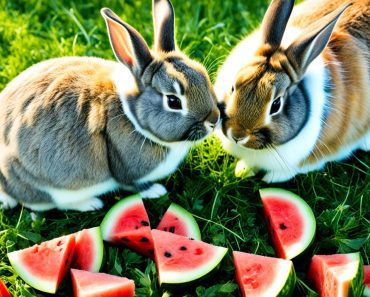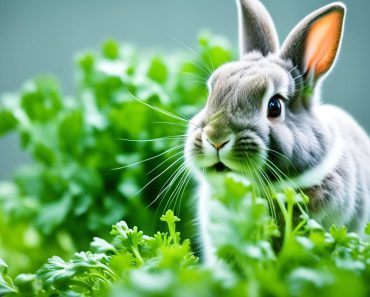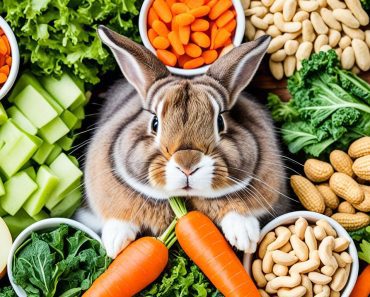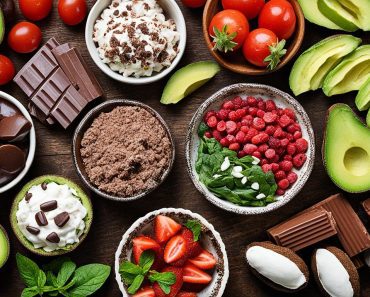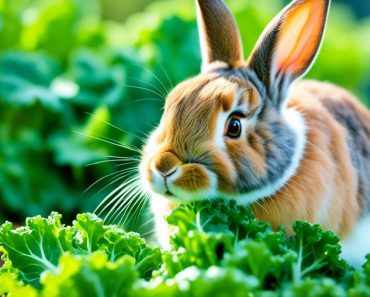As a rabbit owner, it’s important to provide a healthy and balanced diet for your furry friend. While rabbits are primarily herbivores, it’s natural to wonder: can rabbits eat swede?
Swede, also known as rutabaga or yellow turnip, is indeed safe for rabbits to eat in moderation. This root vegetable is packed with important nutrients and can add variety to your rabbit’s diet. However, it’s essential to remember that swede should not be the main component of their meals. Due to its high sugar content, swede should be fed in small amounts as an occasional treat.
When introducing swede to your rabbit’s diet, it’s crucial to do so gradually. Start by offering a small piece and monitor your rabbit’s response. If there are any signs of digestive issues, such as soft stools or decreased appetite, remove the swede from their diet and consult with a veterinarian if necessary.
Always remember to wash swede thoroughly before feeding it to your rabbit and remove any leaves or stems. By following these feeding guidelines, you can ensure that your rabbit enjoys the benefits of swede without any adverse effects on their health.
While swede can be a tasty addition to your rabbit’s diet, it’s important to provide a well-rounded and balanced meal. Leafy greens, vegetables, and other rabbit-safe foods should make up the majority of their daily intake. Consulting with a veterinarian is always recommended for personalized feeding recommendations based on your rabbit’s specific needs.
Can Rabbits Eat Swede? Yes, they can.
- Swede, also known as rutabaga or yellow turnip, is safe for rabbits to eat in moderation.
- Introduce swede gradually to avoid digestive upsets, and monitor your rabbit’s response.
- Wash swede thoroughly before feeding it to your rabbit and remove any leaves or stems.
- Swede should not be the main component of a rabbit’s diet due to its high sugar content.
- A well-rounded and balanced meal, including leafy greens, vegetables, and other rabbit-safe foods, is essential for your rabbit’s health.
The Role of Vegetables in a Rabbit’s Diet
Vegetables play a crucial role in a rabbit’s diet as they provide essential nutrients and contribute to their overall health and well-being.
Leafy greens such as chicory, lettuce, endive, and lambs lettuce are excellent options for rabbits. They are low in calories and high in fiber, which promotes healthy digestion. Including a variety of leafy greens in a rabbit’s diet ensures they receive a balanced mix of vitamins and minerals.
In addition to leafy greens, other vegetables like carrots, cauliflower, broccoli, celery, and cucumber can also be incorporated into a rabbit’s diet in moderation. These vegetables provide additional nutrients and add variety to their meals.
When introducing new vegetables, it is important to do so gradually. Start with small amounts and monitor your rabbit for any signs of digestive issues or allergies. Each rabbit may have different preferences and sensitivities, so it’s essential to pay attention to their individual reactions.
Leafy greens provide rabbits with the necessary fiber for a healthy digestive system. Including a mix of vegetables in their diet ensures they receive a well-rounded and nutritious meal.
Guidelines for Feeding Rabbits Vegetables
When introducing vegetables to rabbits, it is important to follow specific guidelines to ensure their safety and promote their overall health. Here are some essential feeding guidelines for rabbits:
- Introduce vegetables gradually: When introducing new vegetables to your rabbit’s diet, start by offering small amounts at first. This allows their digestive system to adjust and avoids any potential digestive upsets.
- Wash vegetables thoroughly: Before feeding vegetables to your rabbit, make sure to wash them thoroughly to remove any pesticides or dirt. This ensures that your rabbit is consuming clean and safe vegetables.
- Portion control: While vegetables are an important part of a rabbit’s diet, they should not make up the majority of their meals. Aim to provide a minimum of 80% hay, grass, and water, with the remaining 20% consisting of vegetables. This portion control helps maintain a balanced and healthy diet.
- Feeding frequency: It is recommended to feed rabbits approximately 1 cup of vegetables for every 4 lbs of body weight per day. This feeding frequency provides them with the necessary nutrients while preventing overfeeding.
- Rabbit-safe vegetables: Some rabbit-safe vegetables include chicory, lettuce, endive, lambs lettuce, carrots (excluding the roots), cauliflower, broccoli, celery, and cucumber. These vegetables are low in calories and high in fiber, making them suitable choices for rabbits.
Remember to monitor your rabbit’s response to the new vegetables and adjust their diet accordingly. Portion control, introducing vegetables gradually, and offering a variety of rabbit-safe vegetables will help maintain their health and well-being.
“Feeding rabbits vegetables is an important part of their diet, but it should be done in moderation and with care.”
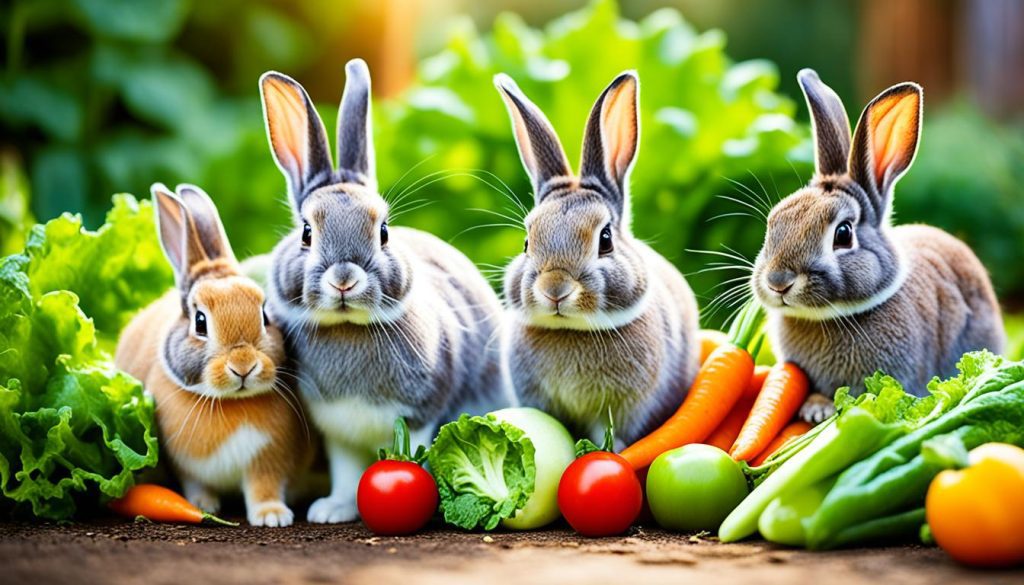
Safe Vegetables for Rabbits
When it comes to keeping our furry friends healthy, providing a balanced diet is essential. Luckily, there are plenty of vegetables that rabbits can enjoy as part of their daily meals. These rabbit-safe vegetables not only add variety to their diet but also provide essential nutrients for their overall well-being.
Here are some examples of nutritious vegetables that are safe for rabbits:
- Artichoke leaves
- Asparagus
- Beetroot (with caution)
- Cabbage
- Carrots (excluding the roots)
- Celery leaves
- Chicory
- Courgette
- Cucumber
- Kale
- Peas
- Peppers
- Pumpkin
- Radish tops
- Romaine lettuce
- Spinach (in moderation)
- Spring greens
- Swede
- Turnips
- Watercress
- And more…
These safe greens for rabbits are packed with essential vitamins, minerals, and fiber, ensuring a well-rounded diet. They help support the rabbit’s digestive system and overall health. However, it’s important to note that introducing new vegetables should be done gradually to avoid any digestive upsets.
“A varied diet is key to keeping our rabbits healthy. By offering a range of safe vegetables, we can provide essential nutrients and flavors that they will love!”
Fruits for Rabbits’ Occasional Treats
While fruits should be considered an occasional treat for rabbits due to their high sugar content, there are still some safe options that rabbits can enjoy in moderation. Fruits like apple (excluding the pips), apricot, banana, blackberries (and leaves), blueberries, cherries (excluding the pits and plant), grapes, kiwi fruit, mango, melon, nectarines, papaya, peaches, pears, pineapple, plums, raspberries (and leaves), strawberries (and leaves), and tomatoes (excluding the leaves) can be offered in small amounts as a special treat. Remember to remove any seeds or pits that may be harmful to rabbits.
Adding fruits to your rabbit’s diet can provide a burst of flavor and variety. It’s important to offer them as an occasional indulgence rather than a staple food due to their high sugar content. The natural sugars in fruits can lead to digestive problems and obesity in rabbits when consumed in excess. However, when offered in moderation, these rabbit-friendly fruits can be a delight for your furry friend.
Safe Fruits for Rabbits
- Apple (excluding the pips)
- Apricot
- Banana
- Blackberries (and leaves)
- Blueberries
- Cherries (excluding the pits and plant)
- Grapes
- Kiwi fruit
- Mango
- Melon
- Nectarines
- Papaya
- Peaches
- Pears
- Pineapple
- Plums
- Raspberries (and leaves)
- Strawberries (and leaves)
- Tomatoes (excluding the leaves)
Remember to always offer fruits in small amounts, as excessive consumption can disrupt your rabbit’s delicate digestive system. It’s also essential to remove any seeds, pits, or leaves that may pose a choking hazard or contain harmful substances. Take the time to observe your rabbit’s reaction to each fruit and adjust their diet accordingly. Providing a balanced and varied diet, along with plenty of fresh water and high-quality hay, will help keep your rabbit happy, healthy, and entertained!
Herbs and Garden Plants for Rabbits
Rabbits can benefit from the inclusion of herbs and garden plants in their diet. Safe herbs for rabbits include basil, coriander, dill, mint, parsley, oregano, rosemary, sage, and thyme. These herbs not only add flavor to a rabbit’s food but also provide various health benefits.
In addition to herbs, there are also wild garden herbs, weeds, and flowers that rabbits can eat. Some examples include borage, calendula, chamomile, chickweed, clover, comfrey, dandelion, goosegrass, lavender, mallow, nettle, nasturtium, shepherd’s purse, sow thistle, and yarrow. These garden plants are beneficial for rabbits and can contribute to their overall well-being.
It is important to ensure that the herbs and garden plants offered to rabbits are free from pesticides and other harmful substances. Always wash them thoroughly before feeding them to your rabbit. In the case of wild garden plants, make sure they have not been treated with any chemicals or come into contact with pollutants.
Guidelines for Introducing New Foods to Rabbits
When introducing new foods to rabbits, it is essential to do so gradually to avoid digestive upsets. Rabbits have sensitive digestive systems, so it’s important to take a cautious approach when introducing unfamiliar foods. Here are some guidelines to follow:
- Start by offering small amounts of the new food. This allows your rabbit’s digestive system to adjust and prevents overwhelming their delicate stomachs.
- Closely monitor your rabbit’s response to the new food. Look out for any signs of digestive issues, such as soft stools, decreased appetite, or changes in behavior.
- If you notice any adverse reactions, remove the new food from your rabbit’s diet and try a different option. Every rabbit is unique, and what may be safe for one might not be suitable for another.
- Keep track of any allergies or sensitivities your rabbit may have. Some rabbits may have specific dietary restrictions or intolerances that you need to be aware of, so it’s important to note any adverse reactions and avoid feeding them foods that cause problems.
- Consult with a veterinarian if you have any concerns or questions about your rabbit’s diet. They can provide specific recommendations based on your rabbit’s health and dietary needs.
Remember, rabbits have specific dietary requirements, and sudden changes in their diet can lead to digestive issues. By introducing new foods gradually and monitoring your rabbit’s digestive health, you can ensure a smooth transition and keep your furry friend happy and healthy.
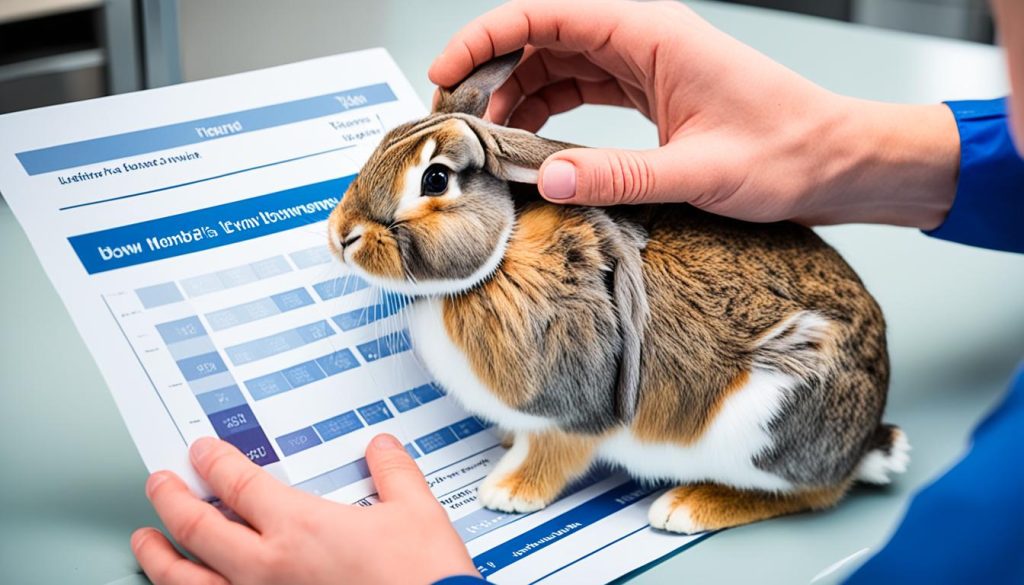
Conclusion
Providing a balanced diet for rabbits is crucial to meet their dietary needs and ensure their overall well-being. While swede can be included in their diet, it is important to feed it in moderation due to its high sugar content. A variety of leafy greens, vegetables, and occasional fruits can offer a wide range of nutrients and flavors for rabbits.
When introducing new foods, it is essential to do so gradually and monitor your rabbit’s response to ensure their digestive health. Following the proper guidelines, such as washing vegetables thoroughly, removing any harmful parts, and practicing portion control, is key to keeping your rabbit safe and healthy. Remember that rabbits require a diet that consists mostly of hay, grass, and water, with vegetables comprising a smaller portion.
By adhering to a balanced diet and providing safe food choices, you can give your rabbit the nutrition they need to thrive. However, it is always advisable to consult with a veterinarian for specific dietary recommendations tailored to your rabbit’s individual needs. With proper care and attention to their dietary needs, you can ensure that your rabbit enjoys a long and healthy life.

